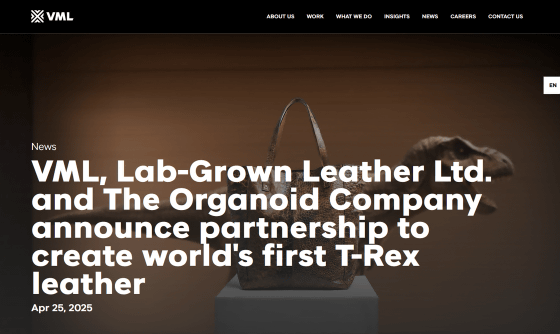A company is trying to create 'Tyrannosaurus leather,' but experts point out problems

VML, Lab-Grown Leather Ltd. and The Organoid Company announce partnership to create the world's first T-Rex leather
https://www.vml.com/news/vml-lab-grown-leather-ltd-and-the-organoid-company-announce-partnership-to-create-worlds-first-t-rex-leather

World's First 'T. Rex Leather' Is Claimed to Come From Dino DNA. Is This For Real? : ScienceAlert
https://www.sciencealert.com/worlds-first-t-rex-leather-is-claimed-to-come-from-dino-dna-is-this-for-real
T. rex researchers eviscerate 'misleading' dinosaur leather announcement | Live Science
https://www.livescience.com/animals/dinosaurs/t-rex-researchers-eviscerate-misleading-dinosaur-leather-announcement
On April 25, 2025, The Organoid Company , a Netherlands-based genome engineering startup, Lab-Grown Leather , a UK-based biotechnology company developing biomaterials, and VML , an American marketing company, announced a partnership to create 'Tyrannosaurus leather.'
Tyrannosaurus leather is made from collagen from fossilized Tyrannosaurus rex, engineered with synthetic DNA designed by The Organoid Company, and integrated into the Lab-Grown Leather product stream. Lab-Grown Leather's technology allows cells to create their own natural structure, resulting in a material that is structurally similar to conventional leather products.
In a statement, VML claims that Tyrannosaurus leather is the first leather product ever developed from a prehistoric species, and is more sustainable than traditional leather products, which are prone to deforestation and environmental pollution. In addition, while traditional leather production raises ethical concerns such as animal cruelty and the decline of rare species, using the skins of extinct prehistoric animals for leather makes it possible to produce leather in a more ethical manner.

The first products made from Tyrannosaurus leather will be accessories, with VML saying it has the ambition to produce flagship commercial luxury fashion items by the end of 2025.
'Through our collaboration with VML and The Organoid Company, we are unlocking the potential of engineering leather from prehistoric species, starting with the formidable T-Rex,' said Choi Konong, CEO of Lab-Grown Leather. 'This venture demonstrates the power of cell-based technology to produce innovative and ethically sound materials.'
'By reconstructing and optimizing ancient protein sequences, we are able to design Tyrannosaurus Leather, a biomaterial inspired by ancient biology, and clone it in a custom cell line,' said Thomas Mitchell, CEO of The Organoid Company. 'At The Organoid Company, we are passionate about pushing the frontiers of synthetic biology.'

While the goal of creating Tyrannosaurus leather is full of romance, some experts have expressed skepticism about this announcement. 'What this company is doing seems like fantasy,' University of Maryland paleontologist Thomas Holtz told science media Live Science. 'There is no preserved DNA from Tyrannosaurus, so there are no Tyrannosaurus genes.'
DNA begins to break down as soon as an animal dies, and although some fragments may persist for up to a million years or more, the oldest DNA preserved at the time of writing is about 2 million years old , including mastodons collected in Greenland. Tyrannosaurus became extinct about 66 million years ago, making it difficult to restore its DNA.
The three companies say they will base their research on collagen found in fossils, and collagen has been identified in some dinosaur fossils, but the collagen in the fossils is too fragmented to be reconstructed, and researchers' understanding of Tyrannosaurus collagen is incomplete.
'There really aren't enough templates to precisely reconstruct the tyrannosaurus-specific collagen molecule,' said Thomas Carr , director of the Carthage Paleontological Laboratory. 'Second, collagen is such a common molecule for all animals that I would be very surprised if there was a species-specific sequence that distinguished tyrannosaurus (or any dinosaur) from its closest living relatives.'
Carr acknowledges that pursuing lab-grown leather makes sense from an ethical perspective, and that the partnership approach is interesting in itself. But he argues that it would be easier to focus on modern animals, like cows or crocodiles, rather than dinosaurs. 'The concept of cruelty-free animal products is a legitimate ethical avenue to explore, so I don't think it needs an exotic, 'ancient' twist,' he says.
Related Posts:







